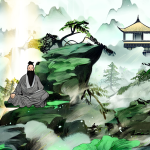《进学解》原文

国子先生晨入太学,招诸生立馆下,诲之曰:“业精于勤,荒于嬉;行成于思,毁于随。方今圣贤相逢,治具毕张。拔去凶邪,登崇畯良。占小善者率以录,名一艺者无不庸。爬罗剔抉,刮垢磨光。盖有幸而获选,孰云多而不扬?诸生业患不能精,无患有司之不明;行患不能成,无患有司之不公。”
言未既,有笑于列者曰:“先生欺余哉!弟子事先生,于兹有年矣。先生口不绝吟于六艺之文,手不停披于百家之编。记事者必提其要,纂言者必钩其玄。贪多务得,细大不捐。焚膏油以继晷,恒兀兀以穷年。先生之业,可谓勤矣。抵排异端,攘斥佛老。补苴罅漏,张皇幽眇。寻坠绪之茫茫,独旁搜而远绍。障百川而东之,回狂澜于既倒。先生之于儒,可谓有劳矣。沉浸醲郁,含英咀华,作为文章,其书满家。上规姚姒,浑浑无涯;周诰殷盘,佶屈聱牙;《春秋》谨严,《左氏》浮夸;《易》奇而法,《诗》正而葩;下逮《庄》《骚》,太史所录;子云相如,同工异曲。先生之于文,可谓闳其中而肆其外矣。少始知学,勇于敢为;长通于方,左右具宜。先生之于为人,可谓成矣。然而公不见信于人,私不见助于友。跋前踬后,动辄得咎。暂为御史,遂窜南夷。三年博士,冗不见治。命与仇谋,取败几时。冬暖而儿号寒,年丰而妻啼饥。头童齿豁,竟死何裨?不知虑此,而反教人为?”
先生曰:“吁,子来前!夫大木为杗,细木为桷,欂栌侏儒,椳闑扂楔,各得其宜,施以成室者,匠氏之工也。玉札丹砂,赤箭青芝,牛溲马勃,败鼓之皮,俱收并蓄,待用无遗者,医师之良也。登明选公,杂进巧拙,纡馀为妍,卓荦为杰,校短量长,惟器是适者,宰相之方也。昔者孟轲好辩,孔道以明,辙环天下,卒老于行。荀卿守正,大论是弘,逃谗于楚,废死兰陵。是二儒者,吐辞为经,举足为法,绝类离伦,优入圣域,其遇于世何如也?今先生学虽勤而不繇其统,言虽多而不要其中,文虽奇而不济于用,行虽修而不显于众。犹且月费俸钱,岁靡廪粟;子不知耕,妇不知织;乘马从徒,安坐而食。踵常途之役役,窥陈编以盗窃。然而圣主不加诛,宰臣不见斥,兹非其幸欤?动而得谤,名亦随之。投闲置散,乃分之宜。若夫商财贿之有亡,计班资之崇庳,忘己量之所称,指前人之瑕疵,是所谓诘匠氏之不以杙为楹,而訾医师以昌阳引年,欲进其豨苓也。”
中文翻译
国子先生早上走进太学,召集学生们站立在学舍下面,教导他们说:“学业由于勤奋而精通,但它却能荒废在游戏玩耍中;德行由于独立思考而有所成就,却因循随俗而败坏。当今圣君与贤臣相遇合,各种法律全部实施。除去凶恶奸邪之人,提拔优秀人才。具备一点优点的人全部被录取,拥有一种才艺的人没有不被任用的。选拔优秀人才,培养造就人才。只有才行不高的侥幸被选拔,哪有学识渊博却不被任用的呢?学生们只担心学业不能精进,不要担心主管部门官吏不够英明;只担心德行不能有所成就,不要担心主管部门官吏不公正。”
话没有说完,有人在行列里笑道:“先生在欺骗我们吧!学生跟着先生,到今天也有些年了。先生口里就没有停止过吟诵六经之文,手里也不曾停止过翻阅诸子之书,记事的一定给它提出主要内容,阐述道理的一定探索它的深奥隐微之处。贪图多得,务求有收获,不论无关紧要的还是意义重大的都不让它漏掉。太阳下去了,就燃起油灯,一年到头,永远在那里孜孜不倦地研究。先生对于学业,可以说是够勤奋了吧。抵制排除那些异端邪说,驱除排斥佛家和道家的学说。补充完善儒学理论上的缺漏,阐发光大其深奥隐微的意义,寻求那些久已失传的古代儒家学说,独自广泛地钻研和继承它们。指导异端学说就像防堵纵横奔流的河流,使它们东注大海;挽救儒家学说就像挽回已经倾倒的狂澜。先生对于儒家学说,可以说是立了功劳的吧。沉浸在如醇厚美酒般的典籍中,咀嚼品味着它们的精华,写起文章来,书卷堆满了家屋。上溯到虞、夏时代的典籍,那文章的浑厚质朴无边无际;周代的诰书和殷代的《盘庚》,那文章的艰涩拗口难读;《春秋》的语言精练准确,《左传》的文辞铺张夸饰;《易经》变化奇妙而有法则,《诗经》思想端正而辞采华美;往下一直到《庄子》《离骚》,太史公的记录;杨雄、司马相如的创作,同样巧妙但曲调各异。先生的文章可以说是内容宏大而外表气势奔放,波澜壮阔。先生少年就知道好学,敢作敢为;长大以后,通晓礼义,行为得体。先生的做人,可以说是完美的了。可是在朝廷上不能被人们信任,在私下里得不到朋友的帮助。进退两难,一举一动都受到指责。刚当上御史就被贬到南方边远地区。做了三年博士,职务闲散表现不出治理的成绩。命运与仇敌相合,不时遭受失败。冬天气候还算暖和的日子里,您的儿女们哭着喊冷;年成丰收而您的夫人却仍为食粮不足而啼说饥饿。您自己的头顶秃了,牙齿缺了,这样一直到死,有什么好处呢?不知道想想这些,倒反而来教导别人干什么呢?”
国子先生说:“唉,你到前面来!要知道那些大的木材做屋梁,小的木材做瓦椽,做斗栱,短椽的,做门臼、门橛、门闩、门柱的,都量材使用,各适其宜而建成房屋,这是工匠的技巧啊。贵重的地榆、朱砂,天麻、龙芝,牛尿、马屁菌,坏鼓的皮,全都收集,储藏齐备,等到需用的时候就没有遗缺的,这是医师的高明之处啊。提拔人才,公正贤明,选用人才,态度公正。灵巧的人和朴质的人都得引进,有的人谦和而成为美好,有的人豪放而成为杰出,比较各人的短处,衡量各人长处,按照他们的才能品格分配适当的职务,这是宰相的方法啊!从前孟轲爱好辩论,孔子之道得以阐明,他游历的车迹周遍天下,最后在奔走中老去。荀况恪守正道,发扬光大宏伟的理论,因为逃避谗言到了楚国,被废黜而死在兰陵。这两位大儒,说出话来成为经典,一举一动成为法则,远远超越常人,优异到进入圣人的境界,可是他们在世上的遭遇是怎样呢?现在我学习虽然勤奋却不能顺从道统,言论虽然不少却不切合要旨,文章虽然写得出奇却无益于实用,行为虽然有修养却并没有突出于一般人的表现,尚且每月浪费国家的俸钱,每年消耗仓库里的粮食;儿子不懂得耕地,妻子不懂得织布;出门乘着车马,后面跟着仆人,安安稳稳地坐着吃饭。局局促促地按常规行事,眼光狭窄地在旧书里盗窃陈言,东抄西袭。然而圣明的君主不加处罚,也没有被宰相大臣所斥逐,岂不是幸运么?有所举动就遭到毁谤,名誉也跟着受到影响。被放置在闲散的位置上,实在是恰如其分的。至于商量财物的有无,计较品级的高低,忘记了自己有多大才能、多少分量而指摘官长上司的缺点,这就如同责问工匠的为什么不用小木桩做柱子,或非议医师的用昌阳延年益寿,而想引进他的豨苓啊。”
英文翻译
In the morning, the imperial professor entered the Imperial College and summoned the students to stand under the lecture hall and taught them, "One's scholarship thrives on diligence and is ruined by play; one's conduct is accomplished through thinking independently and is destroyed by following the crowd. Nowadays, sages and virtuous officials meet, and all systems of governance are fully implemented. The wicked and the evil - doers are removed, and the worthy and the capable are promoted. Those with even a little merit are all recruited, and those with a single skill are all put to use. Talents are selected and nurtured. Only those of little ability and low - grade talents are occasionally chosen by chance. How can there be those who are learned and talented but not employed? Students only need to worry about not being able to excel in their studies, and need not worry that the officials in charge are not discerning; only need to worry about not being able to achieve moral integrity, and need not worry that the officials in charge are unfair."
Before he finished speaking, someone in the ranks laughed and said, "Sir, you are deceiving us! Your disciples have been following you for several years. Sir, your mouth never stops reciting the texts of the Six Classics, and your hands never stop flipping through the books of the various schools of thought. When recording events, you always highlight the key points; when compiling sayings, you always explore the profound meanings. You are greedy for more knowledge and eager to gain, sparing no effort to learn everything, whether big or small. You burn the midnight oil to continue your studies day and night, and you are always diligent throughout the year. Sir, your dedication to learning can be said to be extremely diligent. You resist and reject heretical doctrines and expel Buddhism and Taoism. You patch up the deficiencies in Confucianism and promote its profound and subtle ideas. You search for the long - lost ancient Confucian doctrines and inherit them alone. You block the numerous rivers flowing eastward and turn back the already - overturned waves. Sir, your contributions to Confucianism can be said to be remarkable. You immerse yourself in the rich and mellow classics, savor their essence, and write articles. Your books fill your house. Your writing style is as vast and boundless as that of Yu and Shun in ancient times; as difficult and obscure as the Zhou Dynasty's decrees and the Yin Dynasty's "Pan Geng"; as rigorous as "The Spring and Autumn Annals" and as exaggerated as "Zuo Zhuan"; as strange yet methodical as "The Book of Changes" and as proper yet brilliant as "The Book of Songs". Down to "Zhuangzi" and "Li Sao", and the records of the Grand Historian; the works of Yang Xiong and Sima Xiangru, all are unique in their own ways. Sir, your literary works can be said to be profound in content and unrestrained in style. You started learning when you were young, daring to act; as you grew up, you became well - versed in the principles of conduct and behaved appropriately in all situations. Sir, your conduct as a person can be said to be perfect. However, you are not trusted by the public in official matters, and you do not receive help from friends in private affairs. You are in a dilemma, and every move you make gets you into trouble. You once served briefly as an imperial censor and were then exiled to the southern barbarian regions. You spent three years as a doctor of the imperial academy, but your position was idle and you showed no achievements in governance. Your fate seems to be in the hands of your enemies, and you often suffer defeats. In winter, when it is relatively warm, your children cry out from the cold; in years of good harvest, your wife cries out from hunger. Your hair is thinning, and your teeth are falling out. What good will it do even if you live to an old age like this? You don't think about these things but instead teach others?"
The professor said, "Alas, come here, my child! For a large tree, it can be used as the main beam; for a small tree, it can be used as a rafter; for brackets, short columns, and other small parts, each has its proper place, and when used together, they can form a house. This is the skill of a carpenter. For a precious herb like red - rooted salvia and cinnabar, a red - tipped arrow - head plant and a green - spotted mushroom, cow urine and horse glue, the skin of a broken drum, all are collected and stored, waiting to be used without any waste. This is the skill of a good doctor. To select and promote talents fairly, to be inclusive of both the skillful and the clumsy, to regard the gentle and graceful as beautiful and the outstanding and remarkable as extraordinary, to measure the strengths and weaknesses of each person and assign them appropriate positions according to their abilities, this is the way of a prime minister. In the past, Mencius was fond of debating, and the way of Confucius was thus clarified. He traveled all over the world, and finally died while on a journey. Xun Kuang adhered to the correct principles and promoted the grand theories. He fled from slander to the state of Chu and died in disgrace in Lanling. These two great Confucian scholars, their words became classics, and their actions became models. They were far superior to ordinary people and reached the realm of sages. But how did they fare in the world? Now, although I am diligent in my studies, I have not followed the orthodox tradition; although I speak a lot, my words do not hit the key points; although my articles are strange, they are not useful in practice; although my conduct is cultivated, it is not outstanding among the common people. Yet I still receive a monthly salary from the government and consume the grain from the public granary every year; my son does not know how to farm, and my wife does not know how to weave; I ride a horse with attendants following me, sitting idly and eating. I follow the common and tedious routine, and steal ideas from old books in a narrow - minded way, copying and imitating here and there. However, the sage emperor does not punish me, and the prime minister does not dismiss me. Isn't this my good fortune? Whenever I act, I get slandered, and my reputation is also affected. I am placed in an idle and useless position, which is actually appropriate for me. As for calculating whether one has wealth or not, and comparing one's official rank, forgetting one's own abilities and capabilities and pointing out the flaws of one's superiors, this is like blaming a carpenter for not using a small stake as a pillar, or criticizing a doctor for using the herb changyang to prolong life but wanting to promote the use of the herb xixin."
背景补充
创作背景
《进学解》创作于唐宪宗元和八年(813 年)。当时韩愈已年近五十,虽才华横溢、学识渊博,却仕途坎坷,多次被贬谪。他曾任国子博士,负责教授太学生。在教学过程中,韩愈看到一些学生不努力钻研学问,却抱怨怀才不遇;同时也感慨自己虽有学问和才能,却得不到应有的重用,于是借为学生答疑解惑之机,创作了这篇文章,以抒发自己的感慨,同时也对学生进行劝勉。
作者简介
韩愈(768 年-824 年),字退之,河南河阳(今河南省孟州市)人,自称“郡望昌黎”,世称“韩昌黎”“昌黎先生”。他是唐代杰出的文学家、思想家、哲学家、政治家,是唐代古文运动的倡导者,被后人尊为“唐宋八大家”之首。
韩愈一生致力于复兴儒学,反对佛道二教,主张“文以载道”,强调文章要为儒家的道统服务。他的散文风格雄浑大气、奇崛险怪,说理透彻,逻辑严密,对后世散文的发展产生了深远影响。其代表作品有《师说》《马说》《进学解》等。在诗歌方面,韩愈也取得了很高的成就,他的诗作风格独特,以文为诗,想象丰富,意境奇特。
文章主旨
《进学解》的主旨是通过师生之间的问答,阐述了学习、做人和做官的道理。一方面,韩愈强调了学习要勤奋刻苦、独立思考,要广泛涉猎知识,不断提高自己的学识水平;另一方面,他也指出了做人要注重品德修养,行为要符合道德规范,做事要讲究方法和策略。对于做官,他认为要有真才实学,要能够胜任自己的职责,不能只追求名利和地位。同时,文章也表达了韩愈对自己怀才不遇的愤懑之情,以及对社会现实的不满和批判。
作品影响
《进学解》是韩愈散文的经典之作,具有重要的文学价值和思想意义。在文学方面,它体现了韩愈散文的独特风格和艺术魅力,其论证严密、逻辑清晰,语言生动形象,富有感染力。文章中提出的许多观点和见解,如“业精于勤,荒于嬉;行成于思,毁于随”等,成为了千古名言,激励着后人勤奋学习、努力进取。在思想方面,文章表达了对人才遭遇的同情和对社会不公的批判,体现了韩愈积极用世、关心民生的情怀,对后人的思想观念和价值取向产生了深远影响。此外,《进学解》在教育史上也具有重要地位,它为后世的教育教学提供了有益的借鉴和启示,强调了教师的责任和学生的努力方向。












评论功能已关闭。